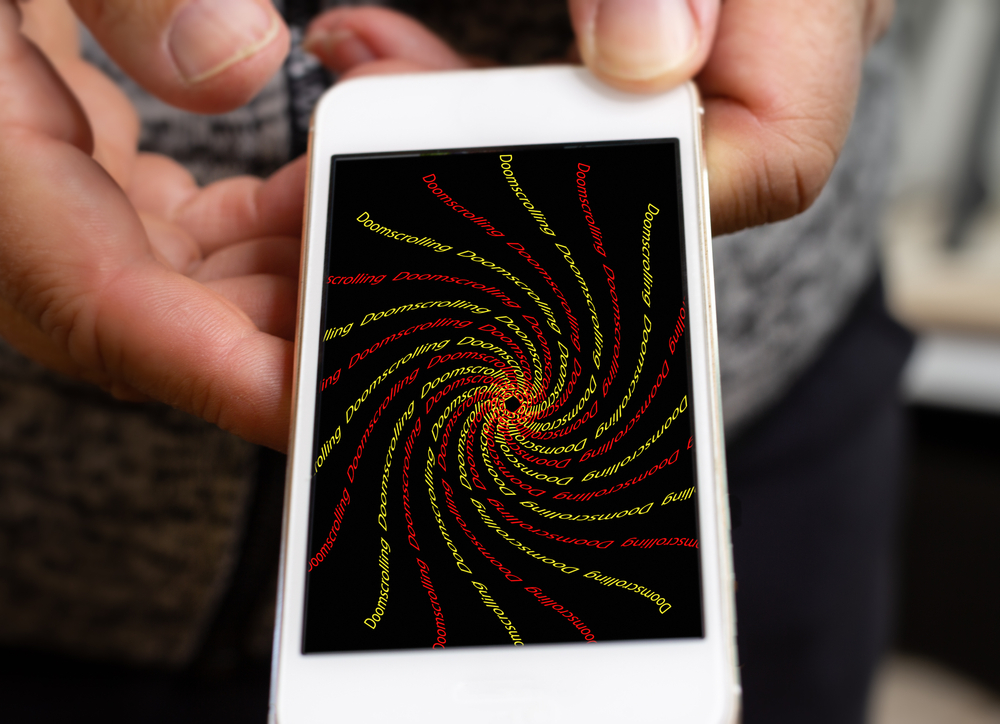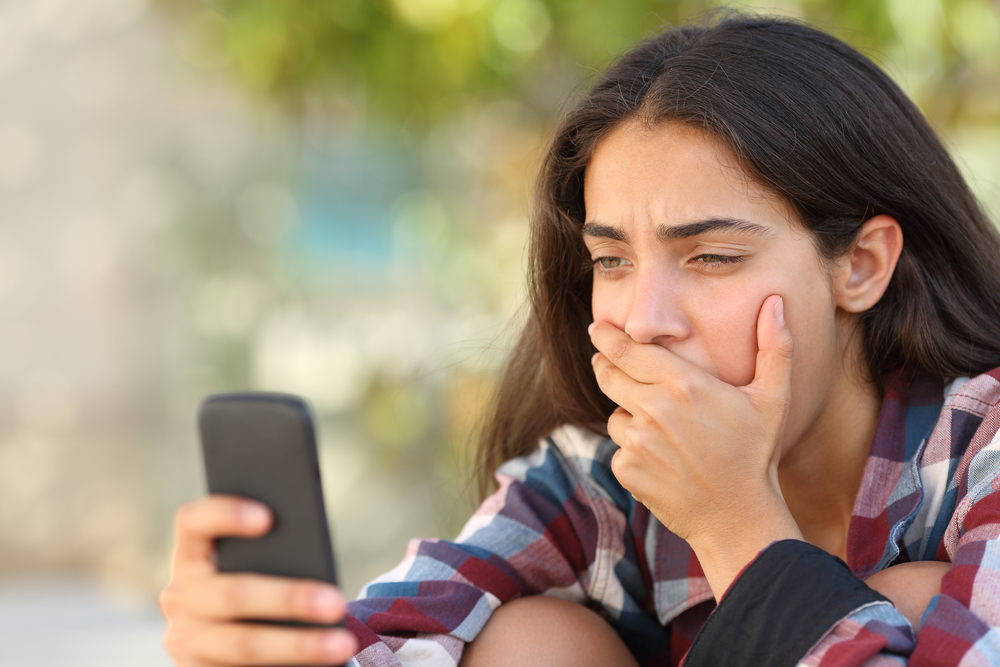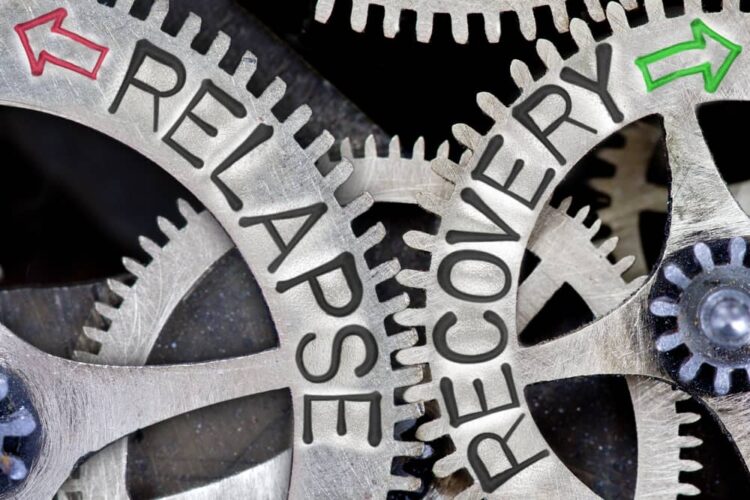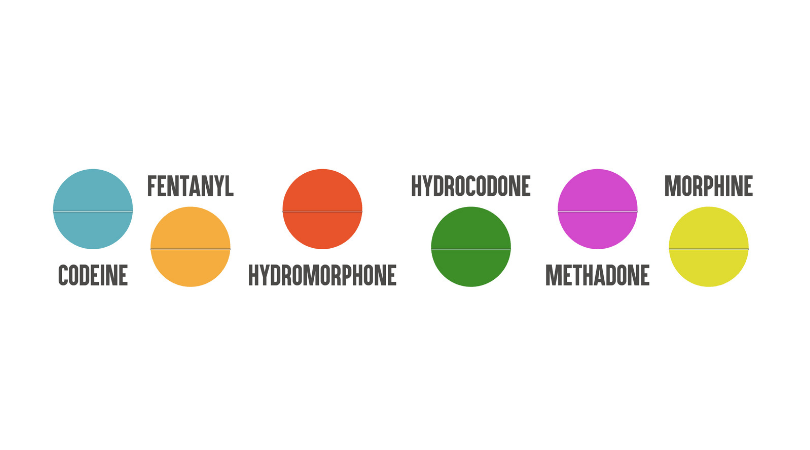
Tips to help you stop doomscrolling
Do you find yourself inexplicably drawn to negative news articles and websites full of doom and gloom? Do you frequently get sucked into an endless cycle of clicking from one depressing social media post to the next?
If you regularly find yourself obsessively scrolling through the never-ending stream of the 24-hour news cycle, or the continuous feed on content sharing platforms, completely enthralled in the details of tragedies and disasters, then you are not alone. Most of us spent a good proportion of 2020, through the long days of social isolation during the lockdown, engaged in the act of doomscrolling, and for some, the habit has continued.
But what is it exactly and why do we do it?

What is doomscrolling?
Doomscrolling, or doom-surfing, is an expression first coined by finance reporter Karen Ho in October 2018 and according to the Merriam-Webster Dictionary refers to “the tendency to continue to surf or scroll through bad news, even though that news is saddening, disheartening, or depressing.”
As humans we are programmed to look out for danger, to be prepared for what is coming next; this is so we can protect ourselves and those we love. When times are difficult and people are struggling, getting as much information as possible by searching news sites and social media feeds feels helpful because it provides us with a sense of control.
We’ve all heard the old cliché; good news doesn’t sell. We have an inbuilt propensity to react more to negative news, and media outlets are aware of this, shock and horror headlines sell newspapers. In today’s modern technological world, they use what is referred to as “clickbait,” captions that grab the attention and get viewers to click on the link to their web pages.
Combine this with the algorithms used by social media websites, which are designed to keep visitors logged on for as long and as much as possible, it makes doomscrolling almost inescapable. Unfortunately, it is not a very healthy way to spend our free time; and could in fact be doing us some serious harm.

Why is doomscrolling harmful?
The answer is doomscrolling has a negative impact on our mental health, it generates stress and fear, and raises anxiety and depression. For those already vulnerable to these mental health conditions – and others such as alcoholism, drug abuse and addictive behaviours – it can trigger episodes and become obsessive or a compulsion.
Alongside the fact that hours are spent wasted falling into a rabbit hole of endless scrolling, studies have shown that any use of social media can have a damaging influence on the way we feel, both about ourselves and the world we live in, increasing isolation and loneliness and causing us to make (often unfavourable) comparisons with others.
In the long-term, the continued worry about the impending doom, or the stress about all the awful things that are happening in the world is terrible for our emotional and psychological wellbeing. We are not designed to be constantly engaging with negative information; doing so leaves us feeling fearful, fatigued and continuously on-edge – the perfect recipe for a mental health breakdown.

How to stop doom scrolling
- Don’t use your phone as an alarm.
If the phone is the first thing you pick up in the morning, even if it is to turn off the alarm, then you will get sucked in straight away. Create a morning ritual that keeps you away from a screen and away from negative news. - Limit your screen time – set a time limit for reading the news.
Not everyone can avoid screens, nowadays computers are a huge part of almost everyone’s lives. However just because you work on your computer it does not mean you can’t set up some limits. Set aside a time for when you read the news, set an alarm to make sure you don’t get sucked in. We all know what it’s like when you think you are going to have a quick browse through social media and then before you know it, you’ve lost an hour of your day. - Avoid social media sites that are full of negative news.
Look at what you are drawn to, are all your regular sites full of doom and gloom? The content that you are being fed reflects what you regularly engage with. Come off the sites that are full of hate, sadness, or aggression. Unfollow people who push your buttons and make you angry. Try out a few new sites, look for ones that fill their feed with a positive message, or stories of hope. - Turn off push notifications and news alerts.
Social media and news sites are deliberately designed to draw you in and keep you scrolling. The notifications are just an alert to make you pick up the phone in the first place and start the process off. Turn off the notifications and restrict yourself to a set time each day for browsing the internet. - Spend more time with family and friends.
Get out and about, mix with people you care about. Not only is this great for your mental health, but it also helps to avoid feelings of loneliness and it keeps you away from your phone screen. - Practice gratitude.
Grateful people are generally happier. Make a list each day of all the things you are grateful to have in your life. Replace your morning scroll through social media with writing a gratitude list; it will be much more beneficial to your mental health and improve your whole attitude for the day ahead.

Rehab in Spain
Here at the luxury residential rehab centre in Ibiza, we have a team of highly qualified staff that are experienced in a range of therapies specifically for the treatment of PTSD, depression, anxiety, and burnout.
We also treat substance (drugs and alcohol) and process (gambling and sex) addictions; and disorders such as codependency and OCD. We offer both EMDR therapy and transcranial magnetic stimulation (TMS) on-site, and equine-assisted psychotherapy is part of our wider treatment program.
For details on admissions please contact [email protected]
Share this information, choose your platform!
5 Tips to Manage your Sobriety in the Run Up to Christmas
Christmas, although celebrated across the globe for bringing magic and joy to an otherwise desolate few months, can be particularly difficult for those who struggle with mental health or addiction issues. December is renowned for over-indulgence, work parties and events …
What is a relapse? And what causes one?
Addiction is a psychological or physical dependence (or in many cases, both) on the use of substances (including alcohol, drugs, prescription medication or nicotine); or the continued compulsive participation in an activity or behaviour (such as gambling, video-gaming, or sex) …
The Opioid Crisis is on the rise
In Britain, the nation’s opioid crisis is on the rise. Last year, the Office for National Statistics reported that fentanyl deaths were up by 29%. What are Opioids? Opioids are drugs generally used to help alleviate severe pain and are …
5 Reasons to Travel Abroad for Rehab
So, you’ve taken the brave first step in admitting that you need help, but where should you seek it? It is important to understand that rehab is not a one-size-fits-all model, so it is vital to find the right place …









